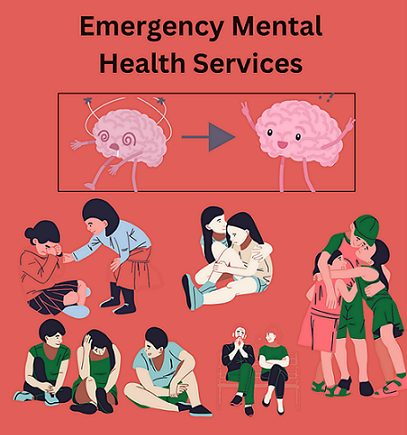Emergency mental health services are more than just a safety net; they are a lifeline, a beacon of hope in the storm. In times of crisis, when mental health concerns rise to urgent levels, access to timely and effective support is crucial. Emergency mental health services play a vital role in addressing immediate mental health needs, providing essential care, and potentially preventing further escalation of crises. These services encompass a range of interventions designed to offer rapid response and stabilization for individuals experiencing acute psychological distress or psychiatric emergencies.
Understanding the Need
Mental health emergencies are visible in various forms, ranging from severe depression and suicidal ideation to psychosis, substance abuse crises, acute anxiety, or panic attacks. Such crises may stem from sudden trauma, underlying mental health disorders, substance abuse issues, or overwhelming life stressors. The need for these situations demands specialized interventions beyond routine mental health care to prevent self-harm, harm to others, or worsening mental well-being.
The Central Role of Emergency Mental Health Services
Emergency mental health services are carefully designed to deliver immediate assistance and stabilization for those in crisis. They operate through diverse channels such as emergency departments, crisis hotlines, mobile crisis teams, psychiatric emergency centers, and specialized units within hospitals.
- Crisis Hotlines: Staffed with trained counselors or volunteers, crisis hotlines offer round-the-clock emotional support, crisis intervention, and guidance towards appropriate resources, providing a vital lifeline to individuals in distress and their support networks.
- Mobile Crisis Teams: Comprised of mental health professionals like psychiatrists, psychologists, social workers, and psychiatric nurses, these teams swiftly respond to crises in community or home settings. They conduct on-site assessments, deliver interventions, and facilitate ongoing mental health services linkage.
- Psychiatric Emergency Departments: Equipped to manage acute mental health crises, psychiatric emergency departments provide comprehensive assessment, stabilization, and short-term treatment. They also oversee voluntary or involuntary hospitalization when needed for safety and proper care.
- Crisis Stabilization Units: Offering short-term residential care, these units cater to individuals in acute psychiatric distress who don’t require hospitalization but can’t be safely managed in the community. They provide intensive support and monitoring to stabilize individuals and connect them with further mental health services.
- Specialized Psychiatric Units: Within hospital settings, these units deliver inpatient treatment for individuals with acute mental health needs. They offer comprehensive psychiatric care, including medication management, therapy, and discharge planning to ensure continuity of care upon discharge.
Challenges
While emergency mental health services are indispensable, challenges persist:
- Resource Constraints: Limited funding and staffing shortages strain these services, leading to longer wait times and insufficient support.
- Stigma and Barriers to Help-Seeking: Overcoming stigma and reluctance to seek help during crises is crucial to ensuring timely intervention.
- Coordination and Cultural Competence: Seamless coordination and cultural competence are essential for effective care delivery.
Opportunities to strengthen emergency mental health services:
1. Integration with Primary Care: Integrating mental health services into primary care settings enhances early intervention and accessibility.
2. Telehealth and Digital Interventions: Leveraging telehealth and digital platforms expands access, particularly in remote areas.
3. Community Partnerships: Collaborating with various stakeholders fosters awareness, prevention, and early intervention.
Conclusion
Emergency mental health services are lifelines in moments of crisis, providing timely intervention, stabilization, and long-term support. Ensuring accessibility, cultural competence, and seamless coordination is vital to bolstering these services and building a resilient mental health support system. By addressing challenges and embracing opportunities, we can fortify emergency mental health services and effectively support individuals in crisis, promoting their well-being and recovery.
Learn more




